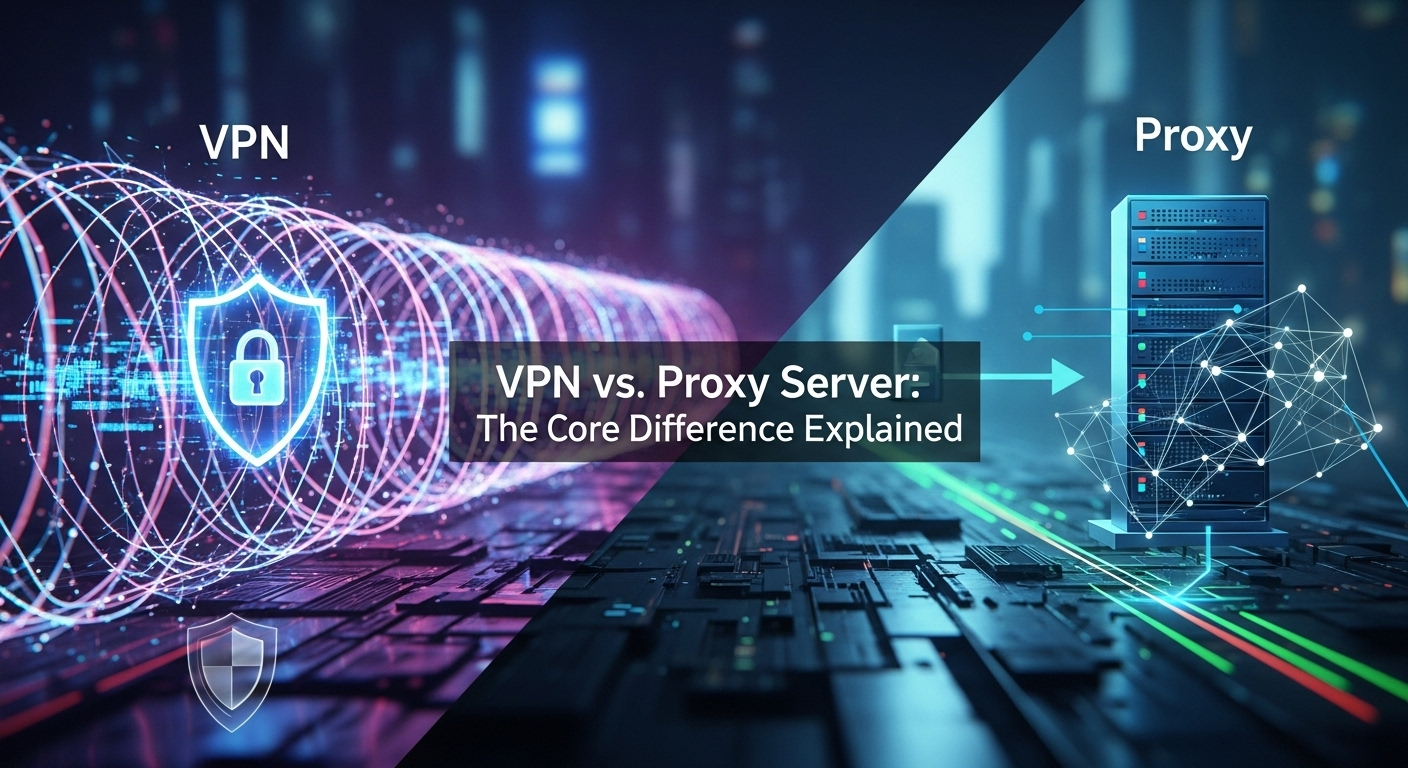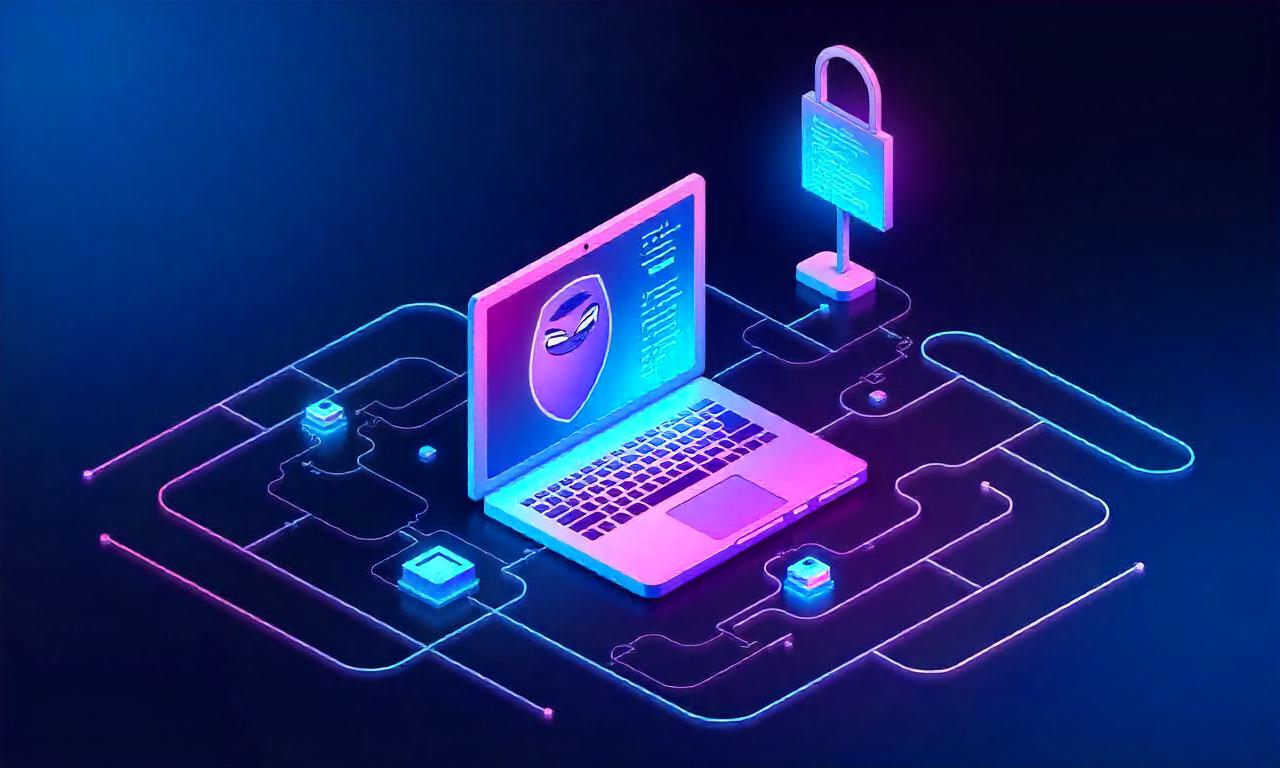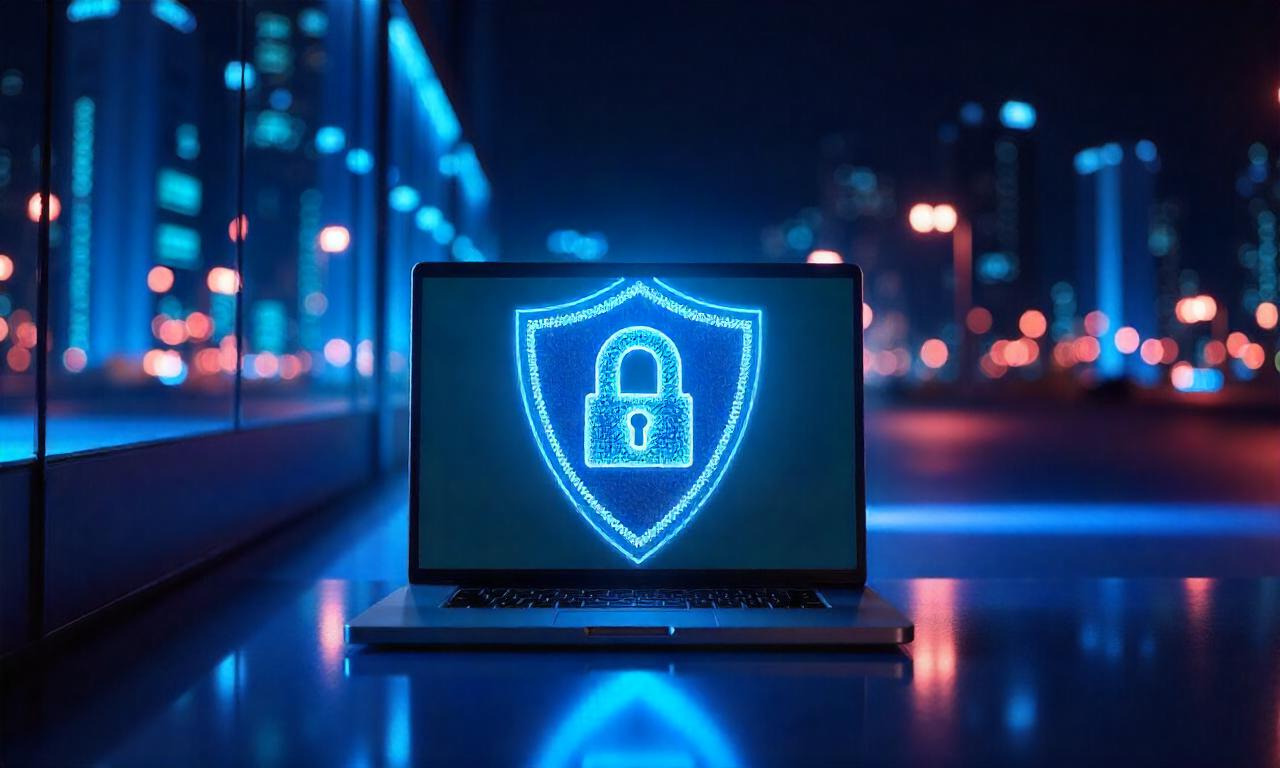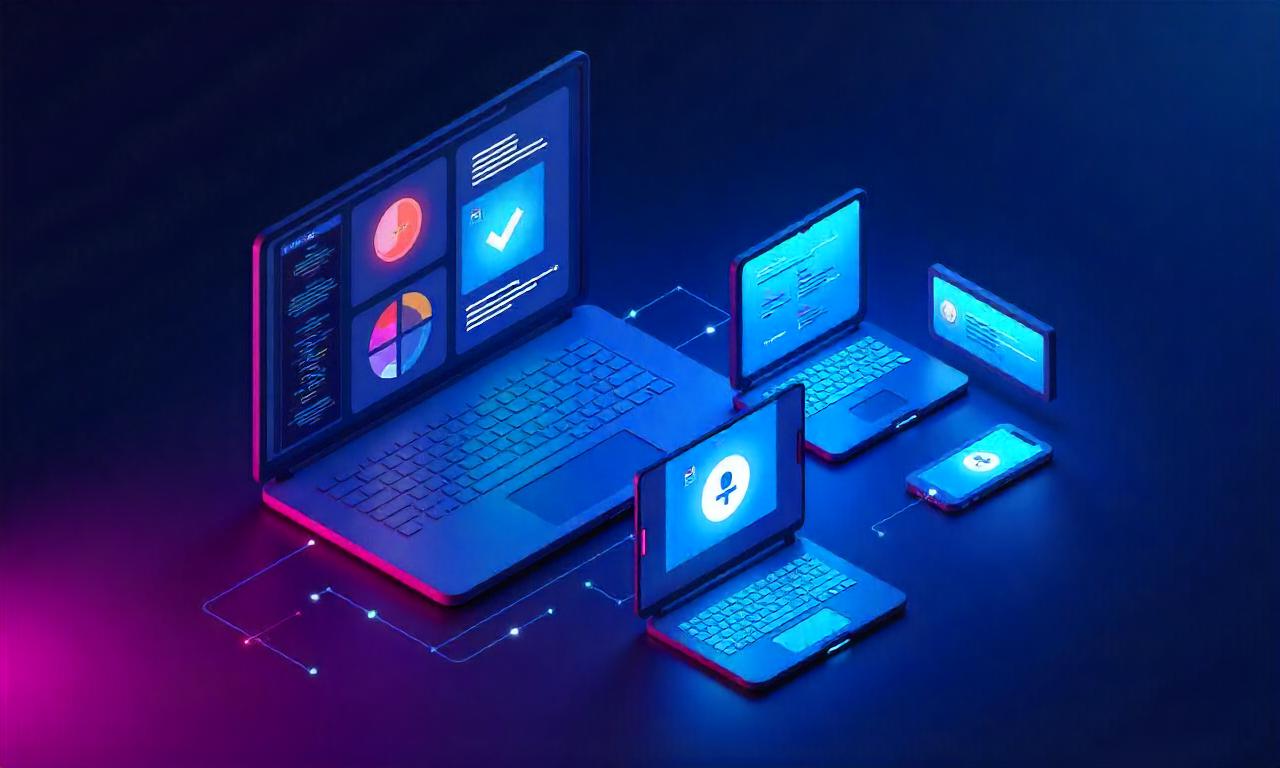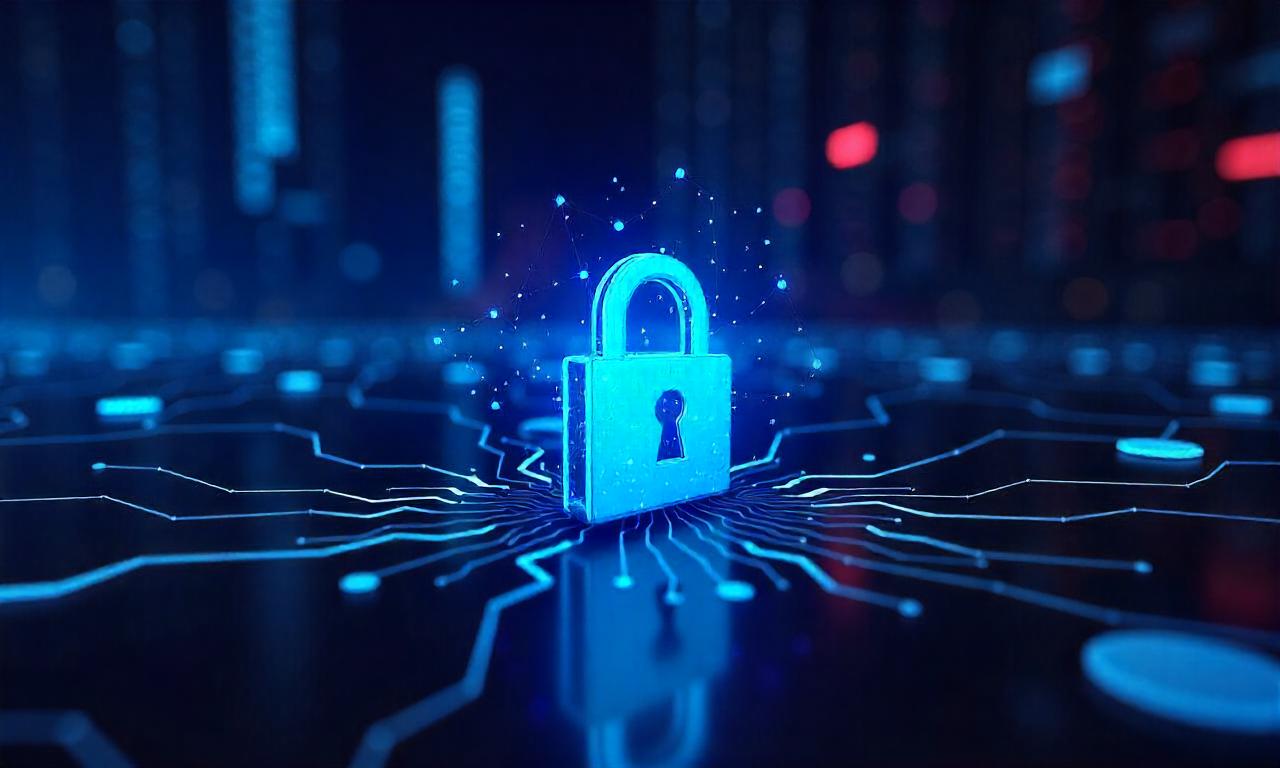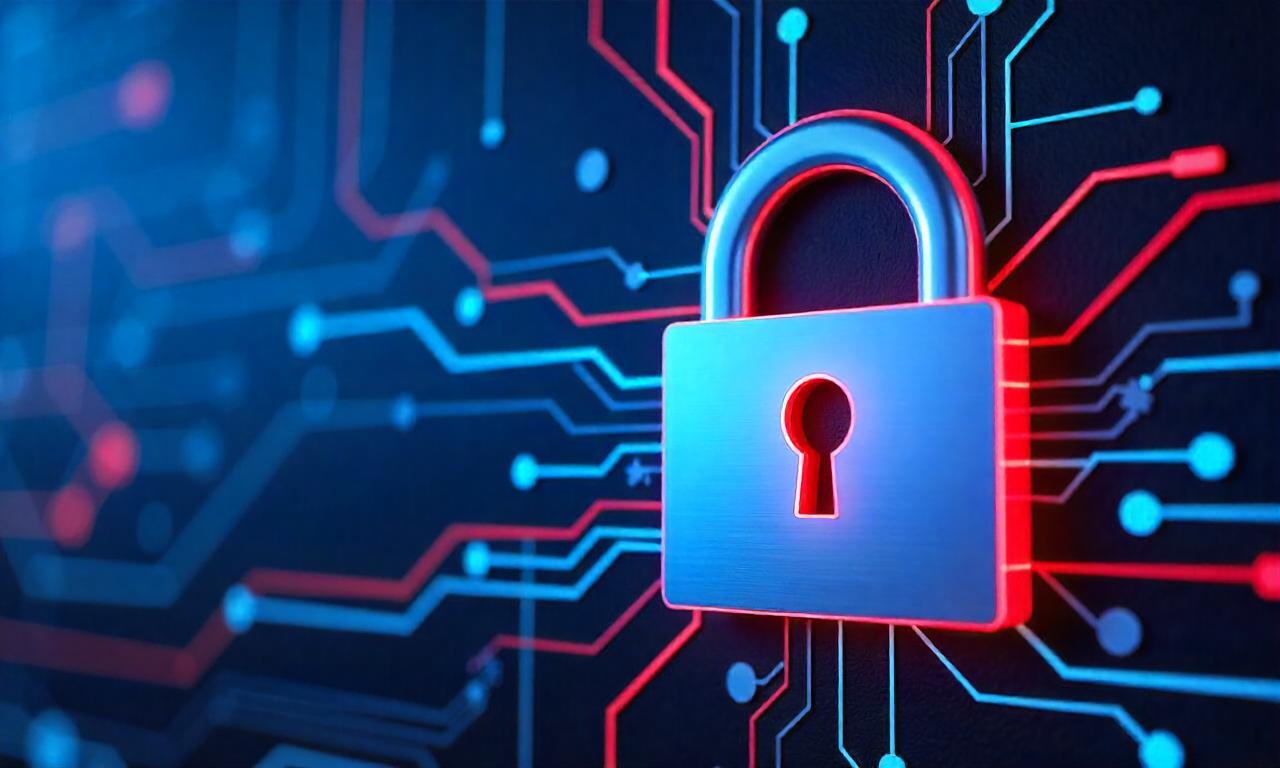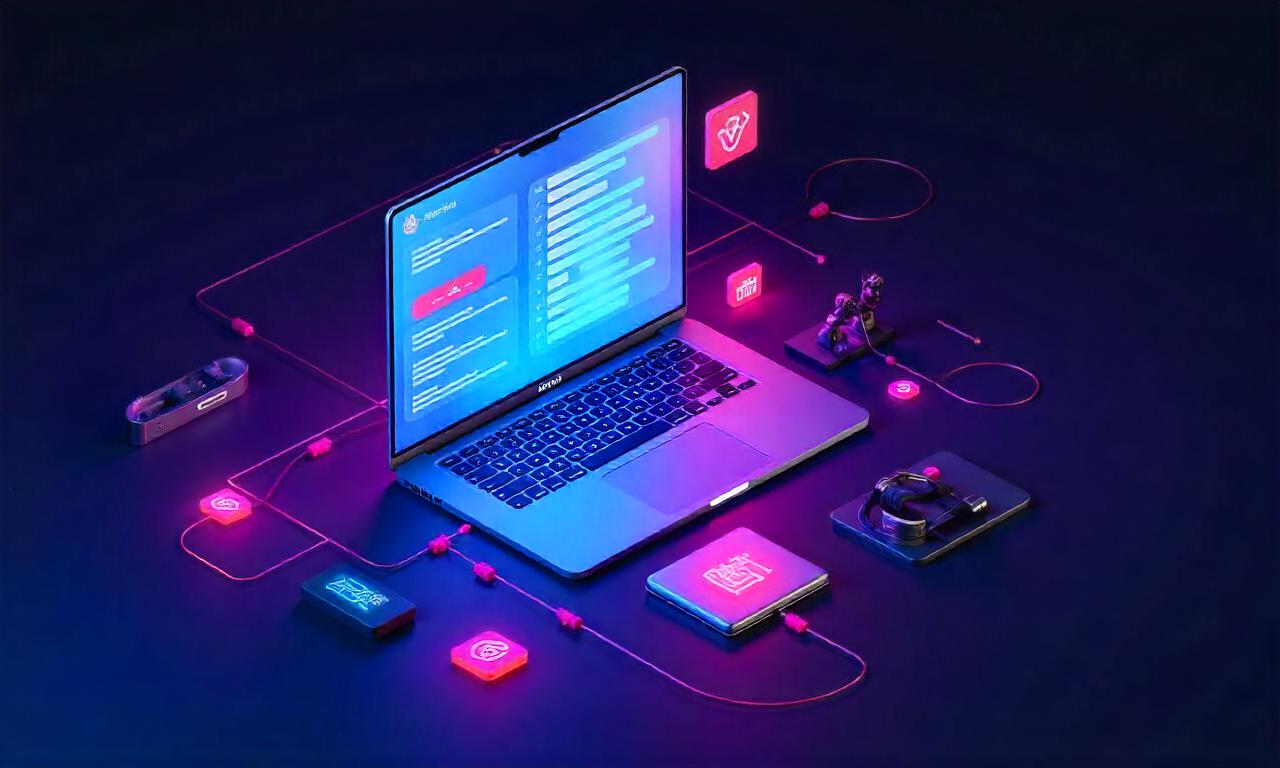In our increasingly digital world, safeguarding online privacy and accessing unrestricted content have become paramount concerns. Two of the most common tools people turn to are VPNs and proxy servers. At first glance, they appear to serve a similar purpose: masking your digital identity by routing your internet traffic through a third-party server. However, this superficial similarity hides a deep chasm in functionality, security, and purpose. Understanding the core vpn vs proxy server difference is crucial for making an informed choice that aligns with your specific needs, whether you're looking for iron-clad security on public Wi-Fi or simply trying to watch a region-locked video. This guide will dissect these two technologies, exploring their mechanisms, core functionalities, security implications, and ideal use cases to help you navigate the complex landscape of online privacy.
Table of Contents
ToggleWhat is a Proxy Server? A Gateway to the Web
At its most fundamental level, a proxy server acts as an intermediary or a "middleman" between your computer and the internet. When you use a proxy, your internet requests are first sent to the proxy server, which then forwards them to the destination website on your behalf. The website sees the request as coming from the proxy's IP address, not your own. This effectively masks your original IP address, which is the primary function of most proxies. It's like sending a letter through a friend; the recipient sees your friend's return address, not yours.
This process is highly effective for simple tasks like bypassing basic geo-restrictions on websites or maintaining a level of anonymity for a single activity. However, a critical point to understand is that most standard proxies operate at the application level. This means you typically configure them for a specific application, such as your web browser or a torrent client. Any traffic from other applications on your device will bypass the proxy and travel directly to the internet, exposing your real IP address.
The most significant drawback and a key differentiator from a VPN is the general lack of encryption. A standard HTTP proxy simply relays your data. While it hides your IP, the data itself is often transmitted in plain text between your device and the proxy server. This means that if someone were to intercept your traffic—such as your Internet Service Provider (ISP), a hacker on the same network, or even the proxy provider itself—they could potentially read your data, see the websites you visit, and capture sensitive information like passwords or financial details.
Types of Proxy Servers
There are several types of proxies, each designed for different purposes. The most common is the HTTP proxy. These are specifically designed to handle web traffic (HTTP and HTTPS protocols). When you configure your web browser to use an HTTP proxy, all your browsing activity is routed through it. This makes them a straightforward solution for accessing websites that might be blocked in your school, office, or country. They can also be used for caching frequently accessed web pages to speed up load times for multiple users on the same network.
Despite their utility for web browsing, the limitations of HTTP proxies are significant. They are application-specific and only interpret web-related traffic. This means they cannot be used to mask your IP address for other critical activities like online gaming, video streaming apps that aren't browser-based, or peer-to-peer (P2P) file sharing. For users needing to anonymize more than just their web browser, an HTTP proxy proves insufficient and narrow in its scope of protection.
SOCKS5 Proxies: A More Versatile Option
A step up from HTTP proxies are SOCKS5 proxies. The key difference is that SOCKS5 proxies are more versatile because they operate at a lower level of the network stack (Layer 5 of the OSI model). This means they are not limited to a specific type of internet traffic like HTTP. A SOCKS5 proxy can handle virtually any kind of data from any application, including web browsing, P2P traffic from torrent clients, FTP for file transfers, and online gaming traffic. This makes them a more flexible and powerful choice for users who need to anonymize a variety of online activities.
However, it is crucial to note that while SOCKS5 is a more advanced protocol, it does not inherently include encryption. While some SOCKS5 implementations can be paired with an authentication method, the data passing through the server is typically not encrypted by default. This leaves your traffic vulnerable to snooping, just like with a standard HTTP proxy. While a SOCKS5 proxy is superior for versatility and handling different types of traffic, it still falls short of providing the comprehensive security and privacy that come with end-to-end encryption.
Transparent Proxies: The Invisible Intermediary
Unlike other proxies that require manual configuration by the user, a transparent proxy is one that you use without even knowing it. These are often implemented by organizations like corporations, schools, libraries, or public Wi-Fi providers. They intercept your connection and route it through a server without any action needed on your part. You might connect to your office Wi-Fi and browse the internet as usual, completely unaware that a transparent proxy is monitoring and filtering your activity in the background.
The purpose of a transparent proxy is generally not to provide privacy or anonymity for the user. Instead, their primary goals are caching, authentication, and content filtering. For example, a school might use one to block access to social media or gaming websites. A company might use it to monitor employee internet usage and prevent access to malicious sites. A public Wi–Fi hotspot at a hotel might use one to enforce its terms of service or display a login portal. These proxies are tools for administrative control, not user-centric privacy.
What is a VPN? Your Encrypted Tunnel on the Internet
A VPN, or Virtual Private Network, takes a fundamentally different and more comprehensive approach to your online privacy and security. Instead of just acting as a middleman for a single application, a VPN creates a secure, encrypted "tunnel" between your entire device and a remote server operated by the VPN provider. All your internet traffic—from your web browser, email client, gaming apps, and background processes—is routed through this tunnel. This not only masks your real IP address but also encrypts your data from end to end.
This encryption is the cornerstone of what makes a VPN so powerful. When your data travels through the encrypted tunnel, it is scrambled and made unreadable to anyone who might try to intercept it. This includes your ISP, government agencies, network administrators, and cybercriminals lurking on public Wi-Fi networks. The VPN server then decrypts your data and forwards it to the internet, receiving the response and sending it back to you through the same secure tunnel. To the outside world, your traffic appears to originate from the VPN server's location and IP address.
Crucially, a VPN operates at the operating system level. Once you connect to a VPN service on your computer or smartphone, it protects your entire internet connection. You don't need to configure it for each individual application. This system-wide protection ensures that no data "leaks" from unsecured apps, providing a holistic security blanket for all your online activities. This makes it a far superior solution for anyone concerned about comprehensive privacy and security.
The Core of a VPN: Encryption
The defining feature that elevates a VPN far above a proxy server is its use of robust encryption. Reputable VPN services use advanced encryption standards, with AES (Advanced Encryption Standard) 256-bit being the industry benchmark. This is the same level of encryption used by governments and militaries worldwide to protect classified information. It is practically unbreakable with current computing technology, meaning that even if your data were intercepted, it would be nothing more than a jumble of unintelligible characters to the snooper.
This encryption protects you from a wide range of threats. On a public Wi-Fi network, like one at a café or airport, a hacker could easily intercept unencrypted traffic. With a VPN, your connection is secure. Your own ISP, which can normally see every website you visit, can only see that you are connected to a VPN server; the actual content of your traffic is hidden from them. This privacy is a fundamental right that a simple proxy cannot guarantee. While a proxy makes you anonymous by hiding your IP, a VPN makes you both anonymous and private by encrypting your data.
Security Protocols: The Blueprint for Your Connection
The secure, encrypted tunnel a VPN creates is built using specific sets of rules known as security protocols. These protocols determine how authentication is handled, how the encryption keys are exchanged, and how the data is transmitted. Different protocols offer varying balances of speed, security, and reliability. Modern VPNs typically allow you to choose from several options to best suit your needs.
Some of the most common and respected protocols include:
<strong>OpenVPN:* Long considered the industry standard, it is highly secure, configurable, and open-source, meaning its code can be vetted for vulnerabilities by the security community. It offers a great balance of security and performance.
<strong>IKEv2/IPsec:* Known for its stability and speed, especially on mobile devices. It is very good at re-establishing a connection if it's temporarily lost, making it ideal for users who frequently switch between Wi-Fi and cellular data.
<strong>WireGuard®:* A newer, more modern protocol that has gained immense popularity. It uses state-of-the-art cryptography and has a much smaller codebase than OpenVPN, making it easier to audit and debug. It is renowned for being significantly faster than older protocols without compromising on security.
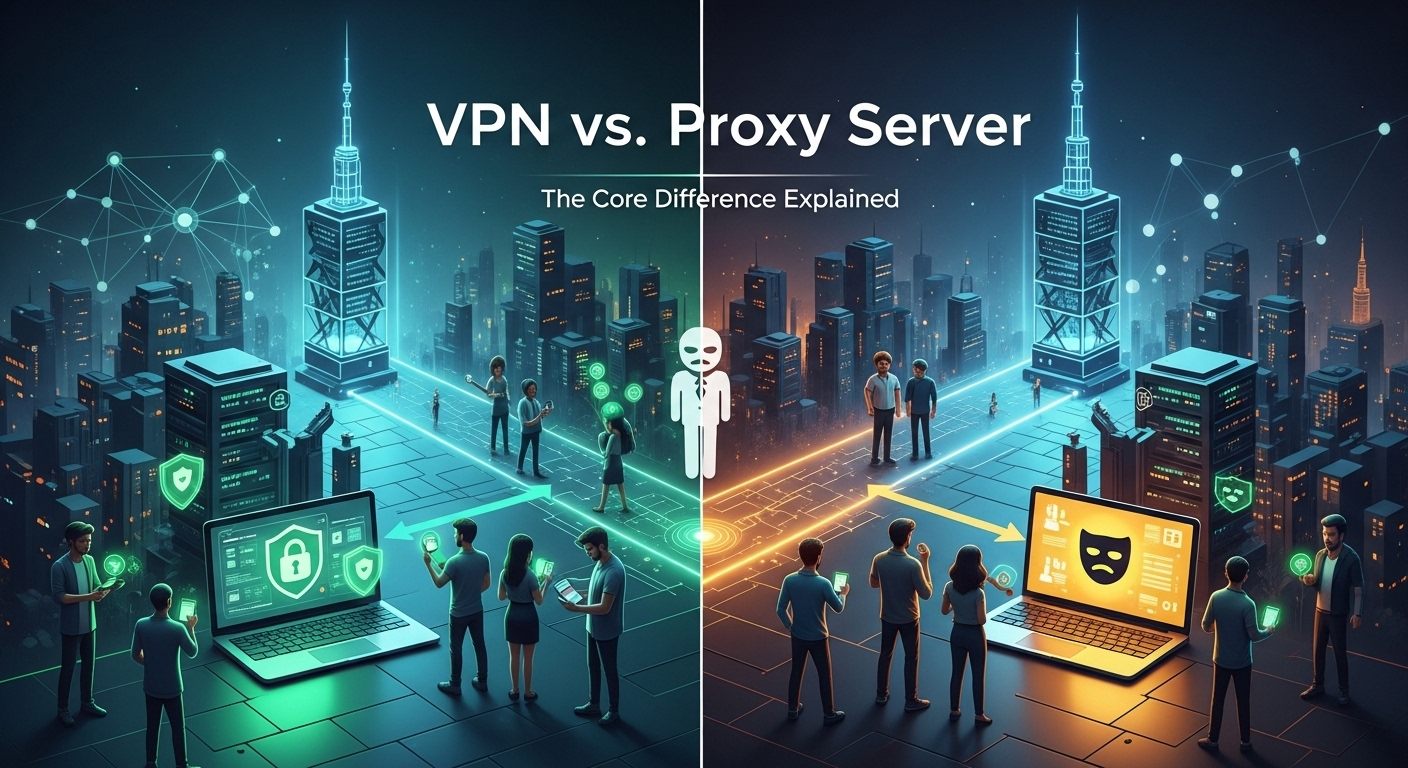
Head-to-Head Comparison: Security and Privacy
When it comes to security and privacy, the debate of VPN vs. proxy server has a clear winner. A proxy server's primary function is to provide a basic level of anonymity by hiding your IP address. It offers no inherent data protection. Your traffic between your device and the proxy is typically unencrypted, exposing you to man-in-the-middle attacks, ISP logging, and surveillance. Using a proxy is like sending a postcard; the postman can read everything you've written, even if the recipient doesn't know your home address.
In stark contrast, a VPN is built from the ground up with security and privacy as its core mission. By creating an encrypted tunnel for all your device's traffic, it provides both anonymity (hiding your IP) and privacy (securing your data). Using a VPN is like sending a letter in a locked, tamper-proof steel box. Not only does the recipient not know your address, but no one who handles the box along the way can see what's inside. This comprehensive protection is essential for anyone handling sensitive information, using public networks, or wanting to prevent their ISP from monitoring their online habits.
A particularly dangerous aspect of the proxy world is the prevalence of "free" proxy services. Operating a server costs money, so if a proxy service is free, you must ask how they are funding their operations. Many free proxies make money by logging your data and selling it to third parties, injecting advertisements into your browsing sessions, or even redirecting you to malicious websites. A reputable, paid VPN service, on the other hand, operates under a transparent business model. They charge a subscription fee and, in return, often provide a strict no-logs policy, which means they do not track, store, or share any information about your online activities. Many top-tier VPNs even subject themselves to independent third-party audits to verify these claims.
Performance and Use-Case Scenarios: Speed vs. Versatility
Performance, particularly internet speed, is another area where VPNs and proxies differ. Because a standard proxy does not have the computational overhead of encrypting and decrypting all your traffic, it can sometimes offer faster connection speeds. This makes it a suitable choice for low-stakes, speed-sensitive tasks where security is not a concern. For example, a researcher using automated scripts to perform large-scale web scraping might prefer the raw speed of a proxy to gather public data quickly from different geographical locations.
However, the "VPNs are slow" stereotype is largely outdated. While some speed loss is inevitable due to the encryption process and the physical distance to the server, premium VPN services have invested heavily in high-speed server infrastructure and optimized protocols like WireGuard®. For most users with a decent broadband connection, the speed reduction when using a top-tier VPN is often negligible and not noticeable during day-to-day activities like HD streaming, online gaming, or video conferencing. The minor potential speed trade-off is almost always worth the immense security benefits.
The clear distinction in security and functionality leads to very different ideal use cases. A proxy is a simple tool for a simple job. It's useful for a quick IP change to bypass a regional block on a news website or to manage multiple social media accounts without triggering IP-based security flags. A VPN, however, is a comprehensive security tool for a wide array of scenarios, including securing your data on public Wi-Fi, preventing ISP throttling or tracking, safely torrenting files without exposing your IP to peers, and reliably accessing geo-restricted streaming services like Netflix or BBC iPlayer, which often actively block proxy traffic.
| Feature | Proxy Server | VPN (Virtual Private Network) |
|---|---|---|
| Encryption | None by default; data is usually exposed. | Strong, end-to-end encryption (e.g., AES-256). |
| Scope of Protection | Application-level (e.g., just the browser). | System-level (protects the entire device). |
| Privacy & Security | Low. Hides IP but not data. Risk of logging. | High. Hides IP and encrypts all data. |
| Speed | Can be faster due to lack of encryption. | Minor speed reduction possible, but often negligible with premium services. |
| Logging Risk | High, especially with free proxies. | Low with reputable paid VPNs that offer audited no-logs policies. |
| Cost | Free and paid options are available. | Primarily subscription-based; free options are very limited and risky. |
| Primary Use Case | Quick IP masking, bypassing simple geo-blocks. | Comprehensive security, privacy, and censorship bypassing. |
Making the Right Choice: When to Use a VPN and When a Proxy Suffices
Ultimately, the choice between a VPN and a proxy server boils down to your specific goal. There is no single "best" tool, only the right tool for the job. You must weigh your need for speed, access, security, and privacy. The decision matrix is relatively straightforward once you understand the core differences we've discussed. Your choice should be determined by the sensitivity of the activity you are undertaking and the level of risk you are willing to accept.
You should consider using a Proxy Server when:
- You need to bypass simple geo-restrictions: If you just want to access a website or watch a YouTube video that is not available in your country, a proxy can be a quick and easy solution.
- Your task is low-stake and not sensitive: For activities like web scraping public data or managing multiple anonymous social media accounts for marketing, where the data being transmitted is not sensitive, a proxy's speed may be preferable.
- You need to control content on a network: In a corporate or educational setting, a transparent proxy is used for filtering content and monitoring usage, serving an administrative function.
You should use a VPN when:
- You are using public Wi-Fi: This is non-negotiable. Public networks are hunting grounds for hackers. A VPN encrypts your connection, making it secure from any eavesdroppers.
- You want to protect your privacy from your ISP: Your ISP can see and log your online activity. A VPN hides your activity from them, providing true digital privacy.
- You are torrenting or engaging in P2P file sharing: A VPN hides your IP address from other peers in the swarm and encrypts your traffic, protecting you from copyright trolls and monitoring.
- You want to securely access geo-restricted streaming content: Premium VPNs are much more effective than proxies at unblocking services like Netflix, Hulu, and Disney+, which have sophisticated detection systems.
- You live in or are traveling to a country with heavy internet censorship: A VPN is an essential tool for bypassing government firewalls and accessing a free and open internet securely.
Frequently Asked Questions about VPNs and Proxies
Q: Can I use a VPN and a proxy together?
A: Yes, it is technically possible to chain a VPN and a proxy, but it's generally unnecessary and overly complex for most users. This setup can significantly slow down your internet connection and make troubleshooting difficult. A high-quality VPN provides all the security and anonymity benefits you need without the added complexity of a proxy.
Q: Are free VPNs as good as paid ones?
A: No, absolutely not. Running a secure VPN service is expensive. Free VPNs often cut corners by offering slow speeds, imposing strict data caps, having a limited number of servers, and, most dangerously, by logging and selling your user data to advertisers and other third parties. A well-known saying in the tech world is, "If you are not paying for the product, you are the product." It is always recommended to invest in a reputable, paid VPN service.
Q: Will a VPN or proxy make me 100% anonymous?
A: No tool can guarantee 100% anonymity. While VPNs and proxies are powerful tools that significantly enhance your privacy and anonymity, they are not foolproof. Determined adversaries with significant resources could potentially find ways to de-anonymize a user. However, for the vast majority of users, a reputable no-logs VPN provides a very high level of protection against common threats like ISP tracking, public Wi-Fi hackers, and corporate surveillance.
Q: Does a VPN slow down my internet speed?
A: A VPN can slightly reduce your internet speed due to the encryption process and the distance the data has to travel to the VPN server and back. However, with top-tier VPN providers that use modern protocols like WireGuard® and maintain a global network of high-speed servers, the speed loss is often minimal and unnoticeable for most activities, including streaming 4K video and online gaming.
Conclusion: Prioritizing Your Digital Needs
The distinction between a VPN and a proxy server is not just a technicality; it's a fundamental difference in security, privacy, and scope. A proxy server is a simple intermediary, a tool for basic IP address masking at the application level, offering no real data protection. It's a quick fix for low-stakes tasks. A VPN, conversely, is a comprehensive security solution. It creates an encrypted, system-wide shield for all your internet activities, protecting you from a broad spectrum of online threats and ensuring your digital privacy.
For the casual user seeking a quick workaround for a simple content block, a proxy might suffice. But for anyone who values their privacy, regularly uses public Wi-Fi, wishes to keep their online activities hidden from their ISP, or requires reliable access to a global internet, the choice is clear. In an era defined by data breaches and increasing surveillance, a quality VPN has transitioned from a niche tool for tech enthusiasts into an essential utility for every modern internet user.
***
Article Summary
This article explains the core difference between a VPN and a proxy server. Proxies act as simple intermediaries, masking your IP address for specific applications like a web browser but typically do not offer encryption, leaving your data vulnerable. In contrast, a VPN provides a much more robust solution by creating a secure, encrypted tunnel for all of your device's internet traffic, operating at the system level. This ensures that your IP address is hidden and all your data is protected from your ISP, hackers, and other snoopers. The choice depends on the user's needs: a proxy is suitable for quick, low-risk tasks like bypassing simple geo-blocks, while a VPN is essential for comprehensive security, privacy, and unrestricted internet access.

